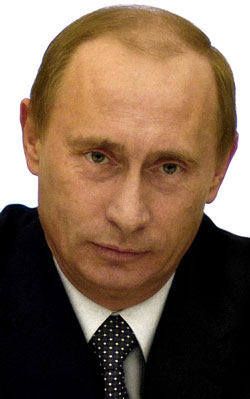A Misguided Extension of “Russian Exceptionalism”

As I write on Sunday, February 27, the Ukrainian capital of Kyiv (Kiev in Russian) is under attack by seemingly overwhelming Russian forces. This is a tragic and dangerous situation first for both Ukraine and Russia but potentially for all of Europe and the Western world. Vladimir Putin has even put his Strategic Nuclear Forces on high alert.
In 1939, Winston Churchill remarked that “Russia is a riddle wrapped in a mystery inside an enigma.” Russian leaders, if fact, dating from the Czars of the Russian Empire, though 70 years of Communism, to non-Communist governments since 1990, have taken some national pride in being mysterious and unpredictable. Their strategic diplomatic and military endeavors often reflect a heavy dose of deception to confuse assumed enemies, and the Russians seldom assume competitive nations are lasting friends. Churchill gave correct advice on this. If you want to understand the Russians, study what the Russians themselves consider their most important national interests. Right now that would be energy production and export and national security.
However, Russian national security interests are not purely materialistic. Americans often speak of American “exceptionalism,” which began to develop in 1630 with the arrival of nearly a thousand English colonists in Salem, Massachusetts, and future Governor John Winthrop’s sermon on Matthew 5: 11-23, comparing America’s future to “a city on a hill” and “a light to the world.” Ronald Reagan and several other American presidents have quoted Winthrop in their inaugurations and important presidential addresses. It may come as surprise to most people, but many Russians, including Vladimir Putin, believe in a “Russian exceptionalism” based on a divinely sanctioned, ultimate survival of the Russian State throughout history, bringing light, order, and security against evil to the world. This has been sealed more firmly in the Russian people by their near-miraculous victories against Napoleon in 1812 and over the Germans in World War II in 1945. The latter victory in the “Great Patriotic War” is much celebrated and has become deeply ingrained in Russian culture. It is the Russian Iliad.
Before the First World War, Russian Orthodox Christianity was also deeply ingrained in Russian life. Following the 1917 Revolution, Communism severely suppressed Christianity and the Russian Orthodox Church. Under Stalin, thousands of Russian Orthodox priests and other active Christians were executed. Despite nearly 70 years of terrible persecution, the number of Russian adults now identifying as Christians had risen to 73 percent in a 2017 Pew Survey, higher than the falling U.S. number of 65 percent. This is a remarkable recovery of Christian identity since the 1990 breakup of the USSR. It also applies to Ukraine, where Christian identity had risen to 72 percent by 2018. In both cases, the overwhelming majority of these Christians are either Russian or Ukrainian Orthodox. The Russian Orthodox Church tends to be very nationalistic, and many closely associate being Russian with being Russian Orthodox.
Americans often get Vladimir Putin completely wrong. Putin is not a Communist. He was a KGB officer, but he had become disillusioned with Communism. He saw first-hand that socialism drags down a national economy and was a major cause of the fall of the Soviet Union. Socialism does not make nations great; it slowly destroys them. Putin is a Russian nationalist and wants to make Russia great again, however, he believes in highly centralized national authority. The Russian transition from Communism to a free enterprise economy was hurried and resulted in billionaire oligarchs controlling far too much of the economy. The Russian economy is probably closer to Italian fascism, with big business and big government joined for power and prosperity. The dominance of big tech in the United States is pushing our economy in the same direction. Putin is an economic reformer but with a statist and authoritarian mindset. Many of his closest associates are former KGB officers.
Putin is an exceptionally savvy politician who won the Russian presidency the first time with 53 percent of the vote and since has never received less than 59 percent. He adroitly maintains an image that most Russians like. He is a tough and sometimes ruthless guy with a down to earth, outgoing side. Having a collective memory of many hard times and brutal invasions, the Russian people place a high value on security. They are also more likely to suffer some loss of freedom for the sake of security than nations with happier histories and have a higher tolerance for ruthless government action against perceived threats to their security. They have a reputation for not smiling much with strangers. They generally place more value on group than individual welfare, and that may have made them more vulnerable to early socialist claims. However, the Puritan John Winthrop, while affirming private property and individual enterprise, urged his listeners to give a higher personal priority to the welfare their neighbors and community.
Putin identifies as Russian Orthodox and participates in Orthodox services and traditions. Over 25,000 Russian Orthodox churches have been built or re-built since 1990 under Boris Yeltsin, Dmitry Medvedev, and Putin. Over 1,200 are in Moscow.
Furthermore, as I wrote in my January 31 article on understanding Putin’s religious vision, Putin’s most frequent political quotes are from Russian Christian philosophers from the 19th and 20th century—Nicholai Berdyaev, Vladimir Solovyov, and Ivan Ilyin. Ilyin was a strongly anti-Communist dissident who was sentenced to death by firing squad in 1922 but was at the last minute exiled to Germany. He believed that Imperial Russia should be kept together for self-defense and considered an independent Ukraine unthinkable “madness.” Though strongly anti-Communist, Ilyin, an Imperial aristocrat, distrusted Western democracy and believed they were dangerous to Russia. Putin was so influenced by him that in 2005, at his own expense, he paid for Ilyin’s body in Switzerland to be exhumed and reburied in the Donskoy Monastery Cemetery in Moscow.
Berdyaev and Solovyov argued that Russia had a messianic mission to transcend atheism and secularism and bring a unified spiritual kingdom to Eurasia.
Putin also quotes from anti-Bolshevik Lev Gumilev. Putin often visits the grave of Ilyin at Donskoy and also visits the graves of famous Russian Christian novelist and historian, Aleksandr Solzhenitsyn and White Army officer Anton Denikin, who Putin had exhumed from his U.S. grave and reburied at the Donskoy Monastery. These are strong indications that Putin’s respect for these men and their ideas is real. Gumilev’s and Ilyin’s ideas have even found their way into foundational documents of Russia’s foreign policy, national security, and military doctrines.
Putin does not have control over the Russian Orthodox Church, but he never misses an opportunity to advance his agenda as fully compatible with Russian Orthodox doctrines.
According to Rebekah Koffler, a former Defense Intelligence Agency senior analyst, who grew up in Soviet Kazakhstan, Putin considers the United States the principal enemy of the Russian Federation and Holy Triune Russia. In fact, Putin considers Russia to have been at war against the United States for a long time. At some point it is bound to be open war at whatever scale it will take for Russia to win. Holy Triune Russia is based on the Kievan Rus empire of that thrived from about 840 to 1240 AD and consisted of Russia, Ukraine, and Belarus. Putin considers the loss of Ukraine from this Holy Triune to be unspeakable humiliation and anathema. Ukraine can be Ukraine, but it must be under the hegemony of Russia. Ukraine membership in NATO, whose alliance is essentially and principally an alliance against Russia is cause for open and determined war.
Putin would also like to recover the glory of the wider influence of the former USSR, but Ukraine is part of the heart of Holy Triune Russia. For Russia to maintain its holy destiny it must be one of the great world powers. Ukraine is the highest defense priority of the Kremlin’s “Monroe Doctrine.”
Koffler’s just published book, Putin’s Playbook: Russia’s Plan to Defeat America is an invaluable resource. It sets a lot right that the mainstream media is getting wrong. She states that the Russians did interfere in the 2016 election as they do for every election, but it was not to help Trump. [In my opinion and probably hers, the Russians would have strongly preferred to avoid Trump’s Peace through Strength policies and rebuilding of the U.S. military.] According to Koffler, the Russians have been trying for years to discredit U.S. election integrity. One of their principal tools is to stir up racial resentments. The Russian Collusion campaign against Trump initiated by Hillary Clinton and the National Democrat Party and continued relentlessly by prominent Democratic Party Congressional leaders, the FBI, deep state, and mainstream media was a well-paid total fraud using purposely created Russian propaganda.
Putin has a range of weapon categories for use in different levels of warfare, including cyber warfare, space warfare, information warfare, special and subversive operations, traditional combat operations, and nuclear missile warfare. A cyber warfare attack or counter-attack could cause tremendous economic damage to the U.S. and NATO allies.
Putin knows that socialism destroys nations, but he is happy to perpetuate it among Russia’s enemies to destroy them. His number one target for destruction is the United States. The Russians would not tolerate Marxist Black Lives Matter activists for a day, but they will help them destroy the United States if possible.
However, as a Russian nationalist, Putin seems to respect American nationalist Donald Trump. Had the Democratic Russia Collusion campaign not severely restricted Trumps attention to Russia, it is possible Putin could have been moved away from American demonization. The U.S. and Russia have some common interests and a common enemy in radical Islam. Putin would also be better off allied with the U.S. than China, which is far more dangerous, deceptive, and intent on world hegemony.
I do not know the outcome of Russia’s invasion of Ukraine and the siege of Kyiv, but I believe such overt military actions against Ukraine are a serious mistake that will prove costly to Russia and Putin. If Ukraine is to be a loyal and beloved member of Holy Triune Russia according to Putin’s dreams, then invading and bombing it will have the opposite result. The Russian Army would be occupying a land of hostile people supporting insurgent warfare against them and intent on making their occupation painful and expensive. The Ukrainian Army and people are currently giving a formidable account of their determination to be independent. In addition, most Russians do not want war and are not hostile to Ukrainians. A few hours ago, a brief newscast claimed that in St. Petersburg, 1,800 demonstrators against Putin’s invasion of Ukraine had been arrested, and there have been several other demonstrations around Russia, resulting in over 3,000 arrests. Putin’s invasion has given NATO unity a badly needed boost, and traditionally neutral Sweden and Finland may seek membership. Just as Napoleon’s overconfident invasion of Russia was the cause of his downfall, Putin’s invasion of Ukraine may mean his downfall and considerable economic and political turmoil for Russia. Putin has proved shrewd in many things, but he may have outsmarted himself in Ukraine.









 Mike Scruggs is the author of two books: The Un-Civil War: Shattering the Historical Myths; and Lessons from the Vietnam War: Truths the Media Never Told You, and over 600 articles on military history, national security, intelligent design, genealogical genetics, immigration, current political affairs, Islam, and the Middle East.
Mike Scruggs is the author of two books: The Un-Civil War: Shattering the Historical Myths; and Lessons from the Vietnam War: Truths the Media Never Told You, and over 600 articles on military history, national security, intelligent design, genealogical genetics, immigration, current political affairs, Islam, and the Middle East. 


